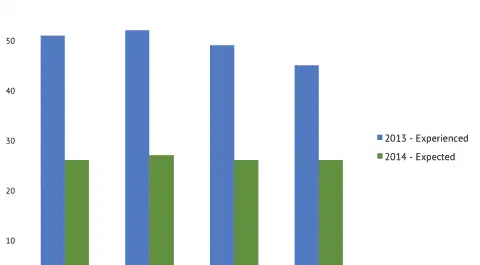The following article is archived and is no longer considered up-to-date. Please interpret its content in the context of the publishing date.

ARCHIVED
Budget Cuts in Africa: Experienced and Expected Changes in Academic Institutions
Read a summary using the INOMICS AI tool
Last year, we conducted a global survey of nearly 800 academics, asking questions about budget cuts at their respective institutions for fiscal year 2013, and their expectations for 2014. We wanted to get a sense of the climate around the world in terms of who is still being affected by the economic downturn, and to what extent, in order to better grasp the daily reality for both employers and job seekers.
In this post, we’ll focus on the continent of Africa. Although we recognize that there is great diversity between the regions in Africa and between particular countries, we were unable to draw effective conclusions at a more specific level due a low response rate in individual countries. At the regional level, however, these numbers offer a positive outlook for researchers and others working on the African continent.
Of those in Africa who took part in our survey, 46% said they work in universities, 17% in private companies or consultancies, 16% in NGOs, 8% in governments, 5% in think tanks, 4% in banks and the remaining 4% in international or aid organizations. This distribution was the most diverse of any region, offering interesting insight for those looking to work in Africa, not only in education, but also in the private sector or for NGOs and government partnerships.
While survey respondents reported budget cuts across the board for 2013, the percentage expecting cuts for 2014 was significantly smaller. Moreover, an impressive 53% of respondents said they anticipated general budget increases for fiscal year 2014. Such a positive outlook was not seen anywhere else around the world. In terms of marketing budgets, 44% of respondents anticipated increases in 2014, up from 19% in 2013. These numbers are very promising for marketing departments across Africa.
-
- Postdoc Job
- Posted 2 weeks ago
Postdoctoral Research Fellow Opportunity
At University of Notre Dame in Notre Dame, United States
-
- PhD Program, Program, Postgraduate Scholarship
- Posted 2 days ago
PhD Program in Management - 11 Fully Funded Scholarships
at Luiss Guido Carli University of Rome in Rome, Italy
-
- PhD Program, Program, Postgraduate Scholarship
- Posted 1 day ago
PhD Program in Economics - 6 Fully Funded Scholarships
at Luiss Guido Carli University of Rome in Rome, Italy












